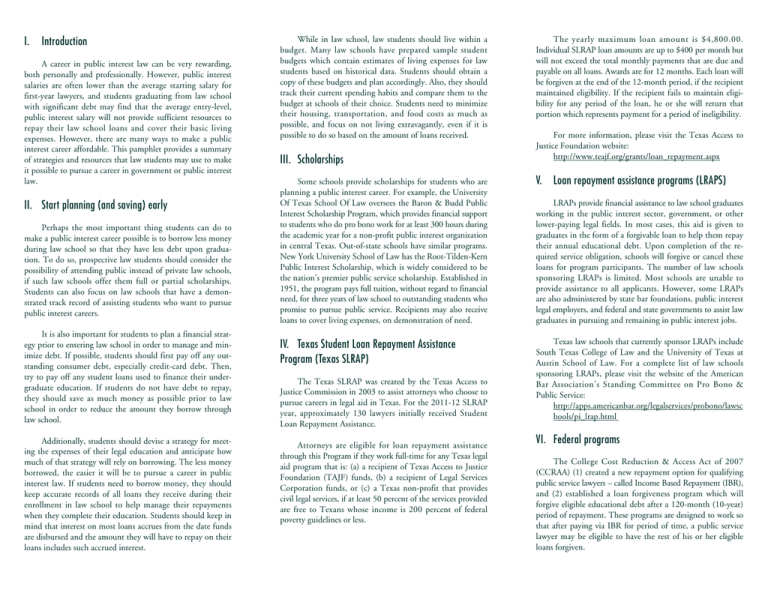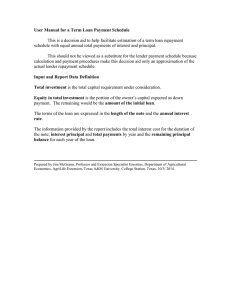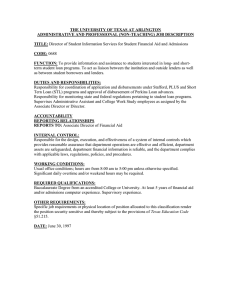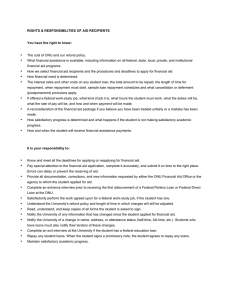Two Fold Pamphlet - State Bar of Texas
advertisement

I. Introduction A career in public interest law can be very rewarding, both personally and professionally. However, public interest salaries are often lower than the average starting salary for first-year lawyers, and students graduating from law school with significant debt may find that the average entry-level, public interest salary will not provide sufficient resources to repay their law school loans and cover their basic living expenses. However, there are many ways to make a public interest career affordable. This pamphlet provides a summary of strategies and resources that law students may use to make it possible to pursue a career in government or public interest law. II. Start planning (and saving) early Perhaps the most important thing students can do to make a public interest career possible is to borrow less money during law school so that they have less debt upon graduation. To do so, prospective law students should consider the possibility of attending public instead of private law schools, if such law schools offer them full or partial scholarships. Students can also focus on law schools that have a demonstrated track record of assisting students who want to pursue public interest careers. It is also important for students to plan a financial strategy prior to entering law school in order to manage and minimize debt. If possible, students should first pay off any outstanding consumer debt, especially credit-card debt. Then, try to pay off any student loans used to finance their undergraduate education. If students do not have debt to repay, they should save as much money as possible prior to law school in order to reduce the amount they borrow through law school. Additionally, students should devise a strategy for meeting the expenses of their legal education and anticipate how much of that strategy will rely on borrowing. The less money borrowed, the easier it will be to pursue a career in public interest law. If students need to borrow money, they should keep accurate records of all loans they receive during their enrollment in law school to help manage their repayments when they complete their education. Students should keep in mind that interest on most loans accrues from the date funds are disbursed and the amount they will have to repay on their loans includes such accrued interest. While in law school, law students should live within a budget. Many law schools have prepared sample student budgets which contain estimates of living expenses for law students based on historical data. Students should obtain a copy of these budgets and plan accordingly. Also, they should track their current spending habits and compare them to the budget at schools of their choice. Students need to minimize their housing, transportation, and food costs as much as possible, and focus on not living extravagantly, even if it is possible to do so based on the amount of loans received. III. Scholarships Some schools provide scholarships for students who are planning a public interest career. For example, the University Of Texas School Of Law oversees the Baron & Budd Public Interest Scholarship Program, which provides financial support to students who do pro bono work for at least 300 hours during the academic year for a non-profit public interest organization in central Texas. Out-of-state schools have similar programs. New York University School of Law has the Root-Tilden-Kern Public Interest Scholarship, which is widely considered to be the nation’s premier public service scholarship. Established in 1951, the program pays full tuition, without regard to financial need, for three years of law school to outstanding students who promise to pursue public service. Recipients may also receive loans to cover living expenses, on demonstration of need. IV. Texas Student Loan Repayment Assistance Program (Texas SLRAP) The Texas SLRAP was created by the Texas Access to Justice Commission in 2003 to assist attorneys who choose to pursue careers in legal aid in Texas. For the 2011-12 SLRAP year, approximately 130 lawyers initially received Student Loan Repayment Assistance. Attorneys are eligible for loan repayment assistance through this Program if they work full-time for any Texas legal aid program that is: (a) a recipient of Texas Access to Justice Foundation (TAJF) funds, (b) a recipient of Legal Services Corporation funds, or (c) a Texas non-profit that provides civil legal services, if at least 50 percent of the services provided are free to Texans whose income is 200 percent of federal poverty guidelines or less. The yearly maximum loan amount is $4,800.00. Individual SLRAP loan amounts are up to $400 per month but will not exceed the total monthly payments that are due and payable on all loans. Awards are for 12 months. Each loan will be forgiven at the end of the 12-month period, if the recipient maintained eligibility. If the recipient fails to maintain eligibility for any period of the loan, he or she will return that portion which represents payment for a period of ineligibility. For more information, please visit the Texas Access to Justice Foundation website: http://www.teajf.org/grants/loan_repayment.aspx V. Loan repayment assistance programs (LRAPS) LRAPs provide financial assistance to law school graduates working in the public interest sector, government, or other lower-paying legal fields. In most cases, this aid is given to graduates in the form of a forgivable loan to help them repay their annual educational debt. Upon completion of the required service obligation, schools will forgive or cancel these loans for program participants. The number of law schools sponsoring LRAPs is limited. Most schools are unable to provide assistance to all applicants. However, some LRAPs are also administered by state bar foundations, public interest legal employers, and federal and state governments to assist law graduates in pursuing and remaining in public interest jobs. Texas law schools that currently sponsor LRAPs include South Texas College of Law and the University of Texas at Austin School of Law. For a complete list of law schools sponsoring LRAPs, please visit the website of the American Bar Association’s Standing Committee on Pro Bono & Public Service: http://apps.americanbar.org/legalservices/probono/lawsc hools/pi_lrap.html VI. Federal programs The College Cost Reduction & Access Act of 2007 (CCRAA) (1) created a new repayment option for qualifying public service lawyers – called Income Based Repayment (IBR), and (2) established a loan forgiveness program which will forgive eligible educational debt after a 120-month (10-year) period of repayment. These programs are designed to work so that after paying via IBR for period of time, a public service lawyer may be eligible to have the rest of his or her eligible loans forgiven. THE STATE BAR OF TEXAS Through IBR, high debt/low income borrowers can significantly reduce their monthly payments if they can demonstrate a “partial financial hardship,” as defined in the CCRAA statutory and regulatory language. (It is essentially a calculation based on the amount of your eligible debt and your income. You do not have to be poverty-stricken to qualify for IBR; on the contrary, its provisions are generous). Through Public Service Loan Forgiveness, borrowers working in a broadly-defined group of public service jobs may have qualified educational loans forgiven after a period of ten years (120 monthly payments) working in public service, provided that during that period they make monthly payments via the IBR Program (or through a combination of IBR and other payments). To qualify for public service forgiveness, three primary conditions must be met: 1. The borrowed funds must be in the “Federal Direct” lending program or consolidated into it; 2. The borrower must work full-time in public service for at least 10 years; and 3. The borrower must pay a prescribed portion of his or her monthly income toward his or her debt for 10 years (120 monthly payments) For complete information and resources on IBR, please visit the website of Federal Student Aid, an office of the U.S. Department of Education: http://studentaid.ed.gov/repay-loans/understand/plans/ income-based VII. Other Online Resources Equal Justice Works provides comprehensive resources regarding loan repayment assistance programs (LRAPs) and federal legislation that enable graduates to pay back their loans as a percentage of income and to get loan forgiveness after 10 years of public service: http://equaljusticeworks.org/ FinAid.org is a comprehensive source of student financial aid information, advice and tools: http://www.finaid.org/loans/publicservice.phtml IBRinfo.org was created by the nonprofit, nonpartisan Project on Student Debt to help student loan borrowers learn about income-based repayment and public service loan forgiveness: http://www.ibrinfo.org/index.php Fed Loan Servicing provides useful information and resources concerning public-service loan forgiveness: http://www.myfedloan.org/manage-account/loan-forgiveness-discharge-programs/public-service-loan-forgiveness.shtml Prepared as a Public Service by the Texas Young Lawyers Association and Distributed by the State Bar of Texas For Additional Copies Please Contact: Public Information Department State Bar of Texas P.O. Box 12487 Austin, Texas 78711-2487 (800) 204-2222, Ext. 1800 www.texasbar.com Heather Jarvis is widely recognized as an expert source of information on student loans. At one time employed by Equal Justice Works, Heather has practiced public interest law for more than twelve years and maintains a comprehensive website of resources and tools for student-loan borrowers: http://askheatherjarvis.com/tools 39852 04/13 FINANCIAL RESOURCES GUIDE FOR A PUBLIC INTEREST LEGAL CAREER



